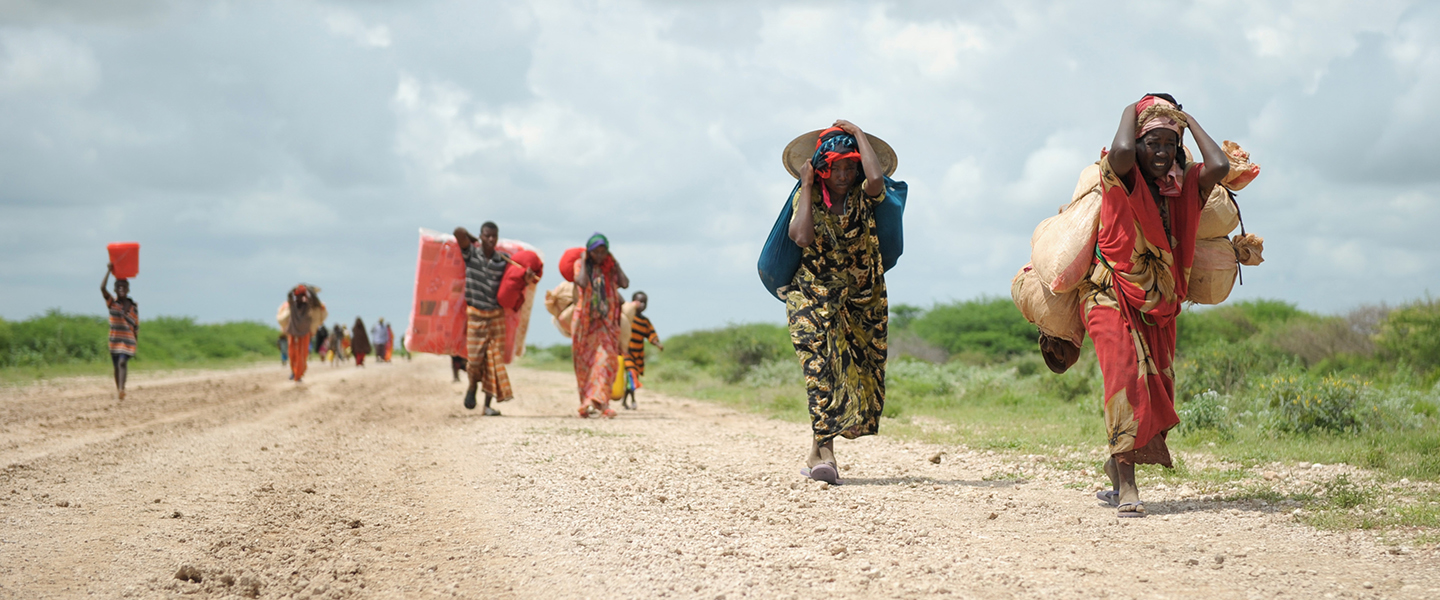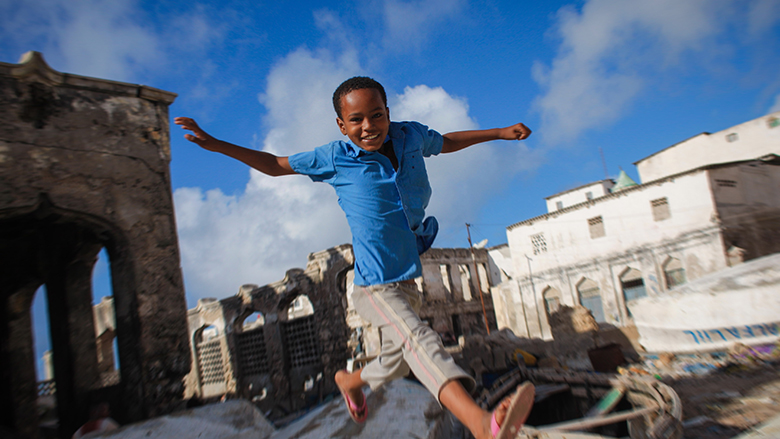Before 2016, most of the WBG's work on forced displacement was limited to analytical and advisory work financed through trust funds. After the launch of the GCFF in 2016 and financing through IDA's Regional Sub-window for Refugees and Host Communities became available in 2018, the number of projects focused on forced displacement began to grow rapidly. This increase in operations has been accompanied by an expanded data and analytics program.
The World Bank developed in 2020, through a consultative process, a Refugee Policy Review Framework (RPRF) to provide a methodology for systematically reviewing the refugee policy and institutional environments in countries eligible for funding from IDA's Window for Host Communities and Refugees. There have been significant refugee policy developments in all of these countries and, while many of these had been initiated years earlier, others are correlated with the eligibility process for additional funding from the Bank.
The report “Estimating Poverty among Refugee Populations: A Cross Survey Imputation Exercise for Chad”, produced by the Building the Evidence on Forced Displacement Program, developed new approaches for measuring poverty of refugees in a context where comparable welfare data for refugees and nationals did not exist. The research has the potential to be scaled up and used to inform programs for other refugee populations.
The IFC’s Digital Data Corridors initiative allows financial institutions to work electronically across borders and receive international credit histories, identity verification, and bank transaction data in real time. With this information, Ukrainian refugees who ran successful small businesses in their country and were told their credit history was insufficient to obtain financing in their host countries, can now get easier access to credit cards, loans, and other services.
In Bangladesh, the Additional Financing for the Health Sector Support Project has supported immunizations for over 87,000 displaced Rohingya children, has provided access to women-friendly services on sexual and reproductive health and rights and on gender-based violence for over 408,000 displaced Rohingya women and girls, and has increased from 4 to 98 the number of facilities providing an appropriate mix of family planning methods.
In Ethiopia, the Economic Opportunities Project provided the impetus and financing for the adoption of the Refugees Proclamation, a new law granting more rights to refugees, which was passed in 2019. The Directives established since the passage of the Proclamation have enabled over 2,000 refugees to access residence permits for the first time, including under the Urban Productive Safety Net Project, where refugees and host communities have been engaged in public works and livelihoods activities. The support has helped improve incomes and social cohesion of refugees and host communities in targeted households.
In Chad, an IDA grant has provided, through the Refugees and Host Communities Project, cash transfers reaching over 70,000 beneficiary households, including 21,000 refugees, between 2018 and 2022. The project is also supporting the capacity building of the National Commission for Refugees (CNARR) to execute its tasks in the refugee camps, benefitting over 200,000 refugees. Separately, the World Bank-UNHCR Joint Data Center on Forced Displacement in Copenhagen, Denmark, supported the Government of Chad to conduct a series of surveys on Chadian and refugee households. Insights from the analytical work helped the government design and pass an inclusive Asylum Law in December 2020, guaranteeing refugees freedom of mobility and equal access to health, education, and justice.
The Development Response to Displacement Impacts Project (DRDIP) is a $630 million regional operation in the Horn of Africa covering Djibouti, Kenya, Uganda, and Ethiopia. The project seeks to mitigate the social, economic, and environmental impacts of protracted refugee presence while also maximizing the opportunities offers. Between 2017 and mid-2023, 5.5 million people, of whom 53 percent are women, have benefited from improved access to basic services such as education, health, water, and sanitation. Livelihood activities have supported over 285,000 people with business grants and training on entrepreneurship, with 150,000 beneficiaries reporting an increase in income. 1,751 infrastructure subprojects targeting water, health and education facilities, and roads and markets have been completed, and another 595 are currently under construction. 397,000 people have been provided access to renewable energy. An additional $3.4 million in funding was provided for the project in Kenya in December 2022 to cover cost increases for schools, health facilities, and water systems subprojects caused by the COVID-19 pandemic. A $180 million second phase in Ethiopia commenced in October 2022 and will run until 2027.
Between 2018 and 2023, the Niger Refugees and Host Communities Support Project (PARCA) directly benefited over 1.12 million refugees, internally displaced persons (IDPs), returnees and host communities across its 1,185 geolocated project sites in 18 communes (of which the Government of Niger and the UNHCR classify 11 as fragile) across five regions of Agadez, Diffa, Maradi, Tahoua, and Tillaberi. Of these, 275,930 are refugees (of whom 244,856 have improved access to public services, and 31,074 have improved access to economic opportunities); and 331,550 are women (of whom 297,305 have improved access to public services, and 34,245 have improved access to economic opportunities).
A total of 373,318 patients benefitted from the 20 newly constructed or renovated functional health centers; 298,261 people benefitted from the 61 newly constructed or renovated functional water points; and 18,882 primary school students use the 148 newly constructed or renovated classrooms.
The PARCA project supported newly constructed infrastructure or renovated 98 other functional infrastructures, including 23 commercial infrastructures that support the local economy, for example, the Telemces cattle market that helped revitalize the surrounding area and benefits 277,203 people. In addition, the 66.6 kilometers of road improvements between Taza and Tillia in the Tahoua region halved the overall travel time from eight hours to four hours between Tahoua city and Tillia.
Income-generating activities improved the livelihoods of 77,847 beneficiaries (including 31,074 refugees and 34,245 women) through a training package and a one-time mobile cash transfer. For example, women in Diffa city doubled the value of corn in October 2022, which they purchased 20,000 FCFA (US$ 32.70 equivalent) per bag and sold as corn flour for 40,000 FCFA (US$ 65.40 equivalent) per bag.
PARCA also strengthened local governance in 15 communes by integrating refugee and IDP needs into 15 annual municipal investment plans over the past five years.
The $750m Second Colombia Fiscal Sustainability, Competitiveness, and Migration Development Policy Financing (DPF), with $31.5m grant financing from the Global Concessional Financing Facility (GCFF), supported the government to implement policies to regularize and integrate Venezuelan migrants into Colombia. A World Bank report informed the government’s policy actions to improve the migrants’ access to basic services and jobs. Some 281,557 migrants (nearly 50 percent were women) obtained Special Permanent Stay Permits (Permiso Especial de Permanencia, or PEP). The permits helped regularize the migrants’ legal status, ensuring that they had access to education, healthcare, clean water and sanitation, housing and childcare services. They also enabled 76,744 job-seeking migrants to get services from the National Employment Agency.
From 2015-2018, with a trust fund grant of $10 million, the Lebanon Municipal Services Emergency Project assisted selected municipalities most affected by the influx of Syrian refugees to provide reliable and quality municipal services and social initiatives. The project helped to provide and distribute 12,423m3 of municipal water per day to 124,572 people, it collected 79 tons per day of solid waste for 42,584 beneficiaries, and enhanced mobility for 62,481 beneficiaries in 14 municipalities by connecting and rehabilitating existing roads to improve access to markets, schools, clinics, playgrounds, and community facilities.
Last Updated: Jun 25, 2024


